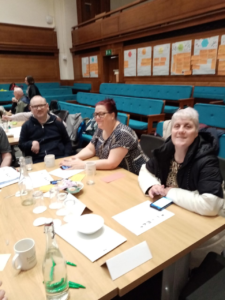Learning Disability England wants to work our members to create a strong, positive network built on trust and shared aims.
Over time we will develop a list of the kinds of policies or ways of working we support. This will be based on evidence from lots of places, especially what people with learning disabilities tell us is important.
We will work out what is on that list by asking our members (a vote), consultation through meetings or from information other people tell us from research or feedback they have had.
We will have this list to give ideas and principles for what matters to people with learning disabilities. It will not be what we expect everyone to agree with or use but it helps Learning Disability England and our members work in good ways that are based on rights, choice, independence and inclusion.
The Representative Body make the final decisions on what Learning Disability England supports to help makes it aims and values happen.
Some examples of what Learning Disability England has talked about so far include:
- The Building the Right Support policy and model
- Registering the Right Support Policy
- Driving Up Quality Code
- REACH standards for supported living
We do not have the time to check on every member but if we are told or find out that what a member says or does is not following Learning Disability England’s aims, purpose or beliefs then we will find out more to check if it is true or affects Learning Disability England members.
We will offer help or ideas for putting something right if we all agreed there was a problem.
We may ask them to leave if we decide that what they are doing does not fit with the aims of being a member.
A subgroup of the Representative Body will be the lead for this. A group with at least a rep from self-advocates, families or allies or organisations will look at any complaints or worries and make the decision on if a member is asked to leave.
That group might ask other Learning Disability England members to join them, but they will make the final decision on behalf of the members Representative Body.
What we will do if it looks like there is a problem
- We will contact the person and organisation. We will let them know what we are worried about or the complaint we have had
- We will ask them what they think is happening or if they want to give us any other information.
- We will offer to meet or talk about what has happened
- The subgroup will look at all the information from the member, Learning Disability England’s aims, values and policies we support and decide based on that
- We will then tell the member what they decided
- If the member thinks it is wrong or unfair they can send a complaint or appeal to the full Representative Body via the co-chairs
The staff team’s job is to help make this happen, not to control it or make the decision.




